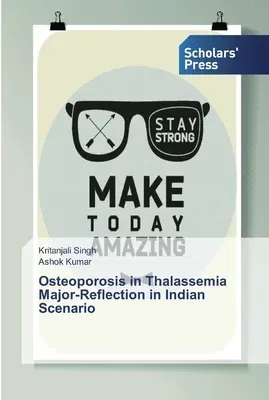Kritanjali Singh
(Author)Osteoporosis in Thalassemia Major-Reflection in Indian ScenarioPaperback, 18 April 2019

Qty
1
Turbo
Ships in 2 - 3 days
In Stock
Free Delivery
Cash on Delivery
15 Days
Free Returns
Secure Checkout
Print Length
160 pages
Language
English
Publisher
Scholars' Press
Date Published
18 Apr 2019
ISBN-10
6138829700
ISBN-13
9786138829706
Description
Product Details
Authors:
Book Format:
Paperback
Country of Origin:
US
Date Published:
18 April 2019
Dimensions:
22.86 x
15.24 x
0.94 cm
ISBN-10:
6138829700
ISBN-13:
9786138829706
Language:
English
Pages:
160
Publisher:
Weight:
244.94 gm

